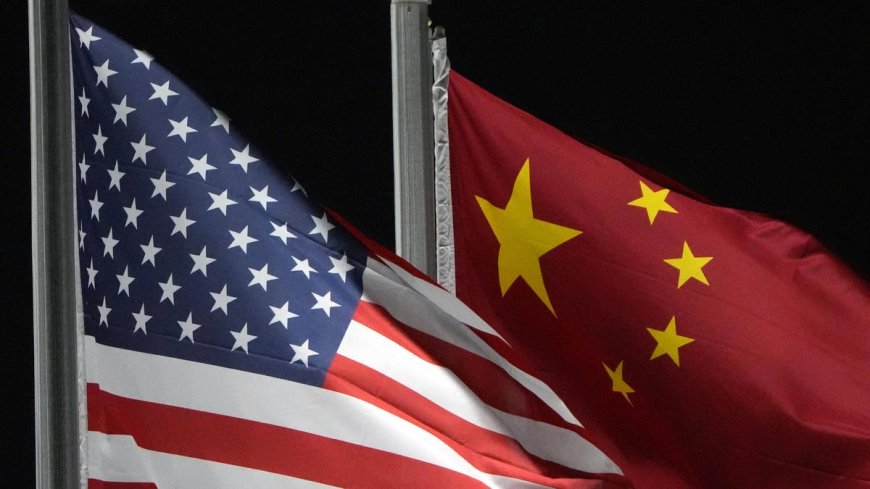China vows in politburo meeting to support firms, workers affected by U. S. tariffs

China Vows in Politburo Meeting to Support Firms, Workers Affected by U.S. Tariffs
Asarkari - Sarkari News, Jobs & Updates
By Anjali Desai
In a significant policy signal, China's top decision-making body, the Politburo, concluded its recent meeting with a strong commitment to bolster support for businesses and workers feeling the pinch from ongoing trade friction, particularly the tariffs imposed by the United States. The meeting, chaired by President Xi Jinping, focused heavily on analyzing the current economic situation and outlining strategies to ensure stability and growth amidst external pressures and domestic challenges.
kam sabdo me kahein to, China's leadership has pledged targeted assistance to companies and employees impacted by American tariffs, signaling a proactive approach to mitigate economic headwinds.
Navigating Economic Headwinds: Politburo's Assessment
The official readout from the Politburo meeting acknowledged that China's economy, while generally recovering, still faces numerous hurdles. These include insufficient domestic demand, operational difficulties for some enterprises, risks in key sectors, and a complex external environment. The impact of tariffs levied by the U.S. administration under various pretexts was implicitly recognized as a key component of this challenging external landscape. The leadership stressed the importance of enhancing economic vitality, preventing and defusing risks, and improving social expectations to consolidate and boost the positive trend of economic recovery.
The meeting emphasized a policy approach that balances short-term response with long-term structural goals. While immediate support for affected entities is crucial, the broader strategy involves deepening reforms, expanding high-level opening-up, and fostering new productive forces, particularly in technology and innovation, to build greater resilience against external shocks like the U.S. tariffs.
Pledged Support Mechanisms
While specific details of the support measures are often rolled out subsequently by relevant government departments, the Politburo's directive sets a clear policy direction. The commitment suggests a multi-pronged approach is likely. For affected enterprises, particularly small and medium-sized enterprises (SMEs) and those heavily reliant on exports to the U.S. market, support could come in the form of tax relief, easier access to credit, reduced administrative burdens, and potentially direct subsidies. The government may also encourage diversification of export markets and provide assistance for companies looking to upgrade their operations or shift production focus.
For workers in sectors impacted by tariffs, the focus is expected to be on maintaining employment stability. Measures could include enhanced unemployment benefits, funding for retraining programs to help workers transition to new roles or industries, and incentives for companies to retain staff rather than resort to layoffs. The government understands that social stability is closely linked to job security, making worker support a critical component of their response strategy to the U.S. tariffs' impact.
Broader Implications and Future Outlook
This announcement from the Politburo underscores Beijing's determination to counteract the negative economic consequences stemming from trade tensions with the United States. It signals to both domestic and international audiences that the government is prepared to intervene proactively to protect its economic interests and ensure social stability. The emphasis on supporting firms and workers highlights the human cost associated with trade disputes and the government's responsibility to cushion the blow.
The effectiveness of these measures will depend on their timely and efficient implementation. Observers will be watching closely how various ministries translate the Politburo's directives into concrete actions in the coming weeks and months. The move also reinforces China's broader economic narrative, which increasingly emphasizes self-reliance, domestic market strength, and technological advancement as pillars of future growth, partly as a strategic response to geopolitical and trade uncertainties.
For more updates on government policies and economic news, visit https://asarkari.com.
Conclusion: A Proactive Stance
China's leadership, through the Politburo meeting, has sent a clear message: it will not passively accept the economic fallout from U.S. tariffs. By vowing concrete support for affected companies and their employees, Beijing aims to stabilize its economy, maintain social order, and navigate the complexities of the current global trade environment. This proactive stance demonstrates a commitment to mitigating external pressures while continuing to pursue long-term economic reforms and resilience. The focus remains firmly on ensuring steady economic performance and safeguarding the livelihoods of its citizens amidst ongoing international friction.
- Team Asarkari
Keywords
China politburo meeting, US tariffs China, China economic support, China trade war response, Chinese companies US tariffs, China worker support, China economic policy, US China trade relations, Beijing economic stimulus, China export sector support, China economy newsWhat's Your Reaction?
 Like
0
Like
0
 Dislike
0
Dislike
0
 Love
0
Love
0
 Funny
0
Funny
0
 Angry
0
Angry
0
 Sad
0
Sad
0
 Wow
0
Wow
0








































